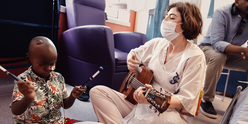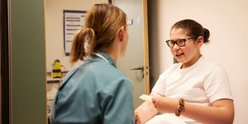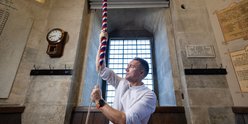‘His favourite lessons at GOSH were science.’ Meet Ilan
16 Jun 2025, 3:56 p.m.
Fourteen-year-old Ilan was diagnosed with acute myeloid leukaemia at Great Ormond Street Hospital (GOSH) in 2022. After two bone marrow transplants, he’s now undergoing chemotherapy and hoping to join a clinical trial.
‘We just didn’t expect leukaemia’
During Ilan’s first stay at GOSH, he travelled across the UK. He drove around Scotland and the Lake District, and he did it all from his hospital bed, on a projector set up by his dad, Niaz.
Video games, especially Forza, a racing game with real-world maps, were a source of fun and entertainment for Ilan, who arrived at GOSH in August 2022.
Just 11 at the time, he had been having stomach pains and bleeding from his ears. Doctors at his local hospital ordered blood tests, which revealed he had leukaemia.
That’s when Ilan and his family were sent to GOSH. “It happened in a whirlwind,” Niaz says. “It was very shocking, and everyone was tearful. We knew something wasn’t quite right; we just didn’t expect leukaemia.”
After about a week, Ilan was diagnosed with acute myeloid leukaemia (AML), a rare type of childhood cancer that affects blood-producing cells in the bone marrow. He started chemotherapy straight away.
Soon, though, it became clear that the treatment wasn’t working, and Ilan was put on the fast track for a bone marrow transplant. “That’s when I got very worried,” Niaz says. “I was weighing up the numbers in my head, I was thinking about the odds.”
At the end of the year, in December 2022, Ilan had a cord blood transplant, which uses stem cells from the blood in a baby’s umbilical cord. Unfortunately, it didn’t take. Two months later, he had a second transplant, with stem cells harvested from Niaz.
‘They remind you that every day isn’t just infusions’
During this stressful time in hospital, Ilan had regular visits with a teacher from the GOSH school – visits that were so important to Ilan and his family. “Ilan had fun,” Niaz shares. “His favourite lessons were science, where he learned how to make a robot, and art.”
Niaz remembers a day when Ilan and his teacher studied Marc Chagall’s stained glass windows and tried to recreate them with acetate paper. “They were surprisingly good,” Niaz says. “Ilan has an artistic bone!”
The Play team, a service fully funded by Great Ormond Street Hospital Charity (GOSH Charity), was also an integral part of Ilan’s experience.
“The Play team keep you active and smiling,” Niaz says. “They remind you that every day isn’t just infusions and injections.” Ilan did lots of arts and crafts with the team and learned to play Uno.
Outside of play and school, Ilan enjoyed requesting songs on Radio Lollipop, the radio station staffed entirely by hospital volunteers, and spent time alongside his parents with a chaplain from the Chaplaincy and Spiritual Care team, another service supported by GOSH Charity.

‘It’s important not to lose hope’
In March 2023, after recovering from his second transplant, Ilan went home. Unfortunately, a week later, he developed cytomegalovirus, a viral infection, and was re-admitted to hospital.
“Both Ilan and I agree that even during the darkest times, it’s important not to lose hope,” Niaz says. In late 2023, after rounds of antibiotics and antiviral drugs, Ilan rang his end-of-treatment bell. His Hickman line, a catheter placed in the chest, was soon removed, and Ilan was able to return to one of his favourite activities: cycling.
“Ilan had just learned to cycle before his diagnosis,” Niaz says, “but once the Hickman line was in, cycling was over. It’s too risky. When it was removed, Ilan went ‘yippee!’.”
The importance of research into childhood cancer
Now, cycling has once again been put on hold. Last autumn Ilan relapsed. He’s currently undergoing intensive chemotherapy, and Niaz hopes they’ll be able to join a clinical trial.
That’s one of the reasons why research is so important to Niaz and his family – particularly the opportunities for research in the new Children’s Cancer Centre at GOSH.
Currently in the early stages of building, the centre will be a world-leading facility that will give more children with cancer the best care, the best chance and the best childhood possible.
“I know it can be done,” Niaz says. “We can get a solution for AML.”
Together, we can build the new Children’s Cancer Centre at GOSH and help more children like Ilan.






